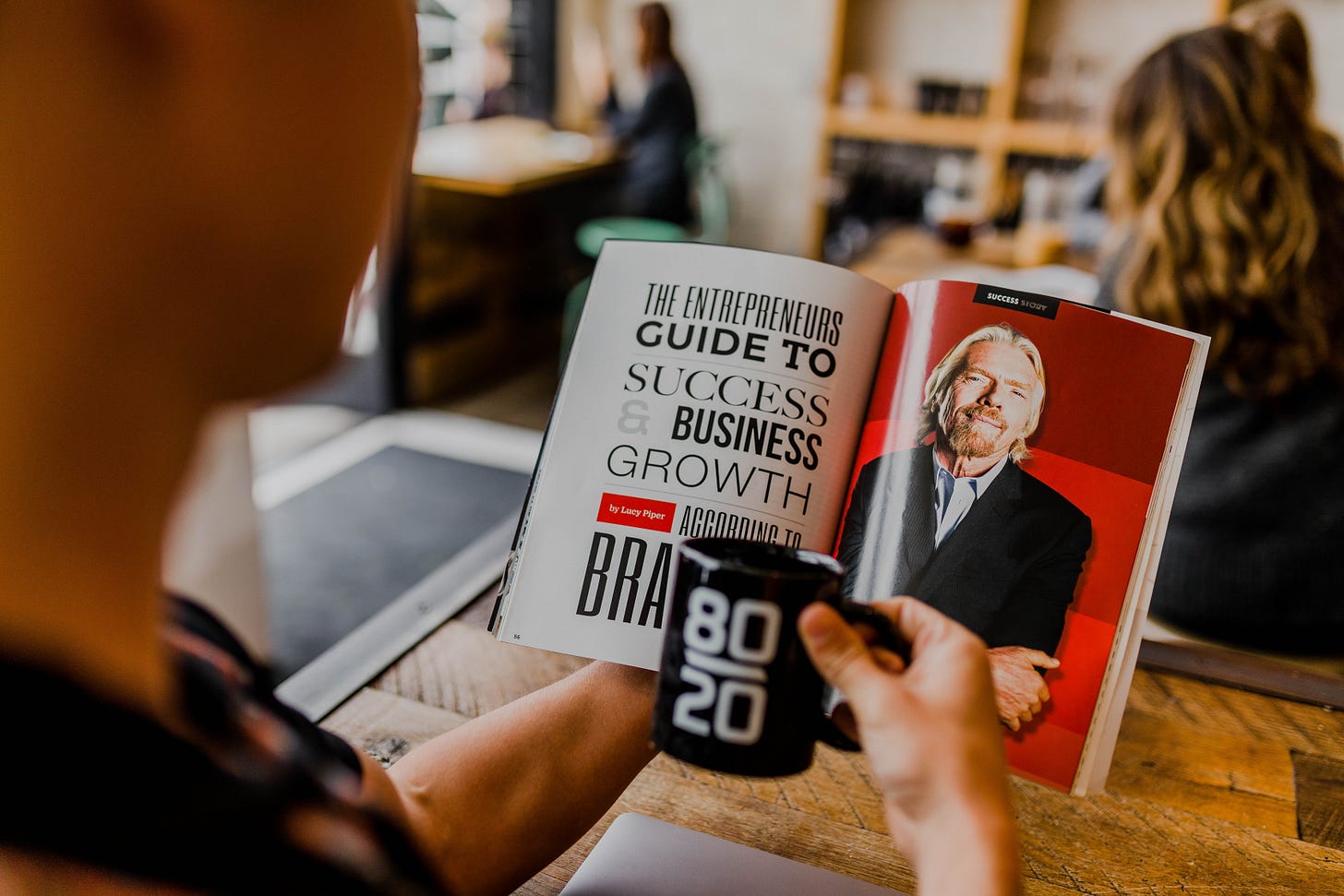From Riches to Regrets: The Fallacy of Pursuing Money Above All Else
Examining the Gap Between What We're Sold and What We Really Need for a Fulfilling Life
How To Be Rich?

You turn on the TV and watch advertisement after advertisement of successful people living their dream lives while you are sitting in your home on a Sunday afternoon with your spouse on the couch drinking milkshakes. You open your phone and see pop-up ads of get-rich-quick schemes. You open YouTube and see the “Financial Gurus” selling you courses and books on “How to go from making $1000 to a million dollars.” Your friend talks about this new cryptocurrency buzzing in the streets and tells you that he will soon have enough money to quit his job and buy a yacht.
*Long sigh*
Welcome to the Capitalistic world of Exceptionalism and Hedonism.
Harsh Truth or Sweet Lies?

There are 8 billion people on this planet as of 2023. I’m sure the media has desensitized you to what that number actually means. To put it in perspective, it is the number eight followed by nine zeros: 8,000,000,000. That’s how many people live in this world.
Comparing that to what is depicted all the time in the news, social media, and YouTube, is a small number of people who have managed to accumulate some success. This is dangerous because it normalizes exceptionalism and causes us to make decisions while being insensitive to actual risk factors. The “If I can make it, so can you” lines make people believe as though life is fair and that the role luck plays in life is almost zero. For every successful person who made it to the top, there are ninety-nine others who were just as capable, hard-working, diligent, or even smarter than the person who made it. Yet, we don’t see that in the news, do we? This is called Survivorship Bias.
The problem with getting information that shapes our perspective of the real world from TV is that it is a skewed representation of reality that is deeply filtered and optimized to generate revenue for these so-called news outlets. The data between the real world and television are highly disconnected. Take a walk down the street and notice how many small businesses fail. There are new shops being set up in their place all the time. However, we rarely ever take heed. We think that our business is different. We assume that what happened to them won’t happen to us. This is called Base Rate Neglect. To put it simply, it is when people ignore the general likelihood of failure and mistakenly believe that they are immune to it.
The tyranny of modern-day media is that we are bombarded only with the stories of "survivors" and so-called "young millionaires," which can make us feel inadequate to a toxic degree in what we do with our lives.
The Dangers of Exceptionalism

In a culture that is encouraging the masses to quit their 9-5 jobs and start businesses, we ultimately pay its price with a cemetery full of failures. This kind of narrative is forcefully shoved down our throats through TV, social media, articles, and billboards and it has second-order consequences.
Let’s talk about Kareem. He is an aspiring young man who is newly married with a baby on the way. He is pressured to earn more so that he can take good care of his forthcoming child. Sure, this may not seem wrong, but in fact, it is commendable as he wants to be a father who can fulfill all of his child's wishes. Kareem watches this interview about some tech entrepreneur who was once in the same shoes as he finds himself today: working a 9-5 job in a company he doesn’t necessarily hate but doesn’t like much either, with a salary that isn’t too bad or too good. Kareem is hit with a bolt of motivation and decides to quit his job to start his own tech business. There’s only one catch: Kareem doesn’t know much about tech or business for that matter. “Sure, I will learn along the way. Steve Jobs had it rough, too,” Kareem says to himself. What he doesn’t realize is that his ability to learn correlates to being successful, it doesn’t cause success. Kareem experiences mediocre success and is really happy that his business is taking off. In the meanwhile, he is blessed with a daughter. Life seems to be going well for him until there is panic on the streets of a new tech start-up that was actually a scam. Amidst all the chaos, despite Kareem reassuring his investors that their money was safe, they pulled the plug on his start-up. Kareem lost a significant amount of his life’s savings and can barely make ends meets now, let alone fulfill the wishes of his newborn daughter.
The real world is full of Kareems and the likes of him who jump the gun under the spell of this narrative. However, we will seldom see them on TV and social media. All we ever see are the new and young entrepreneurs who made it big, partying their life away, and flying in private jets. People buy into the narrative of exceptionalism and think that they, too, are destined to be great. So many ambitious people have lived on this planet until today, but we only remember the names of a handful of them. People quit their stable jobs and gamble their life savings in the hopes that they will become the next Bill Gates or Elon Musk or buy that Lamborghini. I believe, in fact, that there has been a subtle shift in the underlying motives for people to start a business. It is no longer about solving a problem or helping people. People mistake realizing their potential for earning the maximum possible amount of money. Today, it is all about earning money in order to buy luxuries and signal elite status to the rest of the world.
The Antidote
It’s insane to risk what you have for something you don’t need.
— Warren Buffet
Let me clarify that my criticism of the Exceptionalism narrative doesn't mean that I endorse mediocrity. Pursuing financial stability, providing for your children, and improving your quality of life are valid reasons for wanting to earn more money. There's nothing inherently wrong with desiring more wealth. I've personally struggled with this myself. However, focusing solely on making money at the expense of other non-financial aspects of life is impractical. In her book, The Top Five Regrets of the Dying, author Bronnie Ware found that none of the top five regrets had anything to do with money. Three of the top five regrets might open your eyes.
"I wish I hadn't worked so hard."
"I wish I had stayed in touch with my friends."
"I wish that I had let myself be happier."
It's a heart-wrenching truth that in our relentless pursuit of money, we often fail to cherish the priceless moments of life that money can never buy. How many fathers miss out on their child's first steps because they're too busy playing golf to impress a client? How many of us sacrifice precious relationships with our loved ones, for the sake of closing a deal or going on a business trip? It's painful to realize that no amount of money can bring back those lost moments and irretrievable memories. Investing time in writing that novel you always wanted to, learning to paint, serving at the local community center, going on dates with your spouse, visiting your grandparents, traveling to your dream country, and helping your children with their math homework are the sorts of things that make life meaningful that money can never match. Returns on investment in these non-monetary areas of life will outlast any material thing that money can buy for us.
According to a study, the optimal income for happiness is around $75,000. Rising income, it turns out, produces greater happiness until you get to around $75,000. After that, there are diminishing returns, with more income leading to little or no gain in real happiness. People risk ruin, losing their job, landing in prison, or putting their lives on the line just to earn a little more money, and in the process, they lose everything they had worked so hard on. Morgan Housel in his book The Psychology of Money wrote beautifully, “Enough is realizing that the opposite—an insatiable appetite for more—will push you to the point of regret.” The Islamic ideology and the Stoics understood this well centuries ago.
Abu Huraira reported: The Prophet Muhammad, peace and blessings be upon him, said, “Wretched is the slave of gold, silver, fine clothes, and garments. If he is given, he is pleased, but if he is not given, he is displeased.”
Epictetus said, “Wealth consists not in having great possessions, but in having few wants.”
In conclusion, while financial success and freedom are important and admirable goals, they should not come at the cost of our relationships, health, and well-being. It is important to recognize the limitations of money and not let it dictate our entire existence. The key to living a well-balanced life is to understand when enough is enough. It is to consciously step down from the Hedonic treadmill and choose to invest time, effort, and energy in other aspects of life. That is true freedom.



